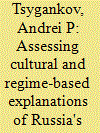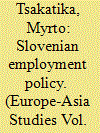| Srl | Item |
| 1 |
ID:
112875


|
|
|
|
|
| Publication |
2012.
|
| Summary/Abstract |
Scholars disagree on how to interpret Russia's assertive foreign policy. According to some observers, Russia's authoritarian culture and political system have historically required the Kremlin to depend on the Western threat image at home and to engage in revisionist behaviour abroad. These observers recommend that Western nations abstain from engaging Russia as an equal contributor to shaping the global system. This article assesses the validity of the authoritarian expansionism theory by comparing it to other prominent perspectives on foreign policy, realism and constructivism. The article argues that, by perceiving Russia's historical and institutional distinctness as fundamentally threatening to the West, the theory overlooks important sources of foreign policy contestation at home and potentially varying directions abroad. The article selects the historically important cases of the Crimean War, the Cold War and the Russia-Georgia War to demonstrate the theory's flaws and to highlight the role of factors other than Russia's authoritarianism in the nation's foreign policy.
|
|
|
|
|
|
|
|
|
|
|
|
|
|
|
|
| 2 |
ID:
112873


|
|
|
|
|
| Publication |
2012.
|
| Summary/Abstract |
This article examines complex patterns of interaction between human settlement and the environment in the industrialised Russian north. I analyse how new mining towns, built during the Soviet period, were located and integrated into the environment. Residents have participated in the industrial processing of natural resources in the work domain, also developing a strong emotional attachment to the natural environments while spending leisure time around the cities. In both perception of physical space and ideas about place, the main dividing principle is between the spheres of work and leisure.
|
|
|
|
|
|
|
|
|
|
|
|
|
|
|
|
| 3 |
ID:
112877


|
|
|
|
|
| Publication |
2012.
|
| Summary/Abstract |
This article examines the link between oil abundance and regime durability by providing insight into how and why oil-rich leaders use elections to maintain power. Using data from presidential elections in Central Asia, the article argues that oil-rich leaders are better able to manipulate their economies in the run-up to elections than their resource-poor counterparts. Oil-rich leaders use oil profits to increase pre-electoral spending to increase popular support, to deter potential opposition and to secure elite loyalty. Such electorally timed increases in spending help oil-rich leaders increase their re-election prospects and ensure their continued control over their countries' resources.
|
|
|
|
|
|
|
|
|
|
|
|
|
|
|
|
| 4 |
ID:
112876


|
|
|
|
|
| Publication |
2012.
|
| Summary/Abstract |
The article examines the harnessing of the contemporary Russian diaspora in certain domains of Russia's international relations. It looks specifically at Russian officialdom's ambivalent efforts at developing and engaging with a global network of state-backed diaspora associations, especially as instruments of cultural outreach. The focus is on the relatively recent implementation of this strategy in the West. The first half of the article discusses the ideological ambiguities of this project in general terms; the second examines how it plays itself out in practice, on the example of the United Kingdom. The article suggests that analysing the ambiguities established in the relationship between state and diasporic structures in this context is vital to understanding the current role of the Russian state in the politics of Russian diasporisation.
|
|
|
|
|
|
|
|
|
|
|
|
|
|
|
|
| 5 |
ID:
112874


|
|
|
|
|
| Publication |
2012.
|
| Summary/Abstract |
Slovenian employment policy was subject to 'soft' Europeanisation despite the lack of normative resonance between entrenched policy ideas and new policy ideas embedded in the European Union's Employment Strategy. The key mechanisms at work are shown to be voluntary policy transfer and diffusion, rather than strategic use of Europe by key domestic actors to bring about policy change. This article argues that normative resonance is not a necessary condition for 'soft' Europeanisation and highlights the importance of other domestic factors, such as norms of consensus-seeking and relative independence from international financial capital as mediating factors that can explain policy impact.
|
|
|
|
|
|
|
|
|
|
|
|
|
|
|
|
| 6 |
ID:
112878


|
|
|
|
|
| Publication |
2012.
|
| Summary/Abstract |
Nascent democracies usually adopt measures of transitional justice to deal with the legacies of undemocratic regimes. This article examines one of the most comprehensive programmes of transitional justice which has been implemented in the Czech Republic since 1990. Based on a survey conducted in 2010, 10 policies are assessed by means of descriptive statistics, and by examining their effect on the perception of justice, truth and reconciliation. Property restitution is viewed as the most successful policy for dealing with the past; it contributes to the positive perception of both justice and truth but it undermines the perception of reconciliation.
|
|
|
|
|
|
|
|
|
|
|
|
|
|
|
|
| 7 |
ID:
112872


|
|
|
|
|
| Publication |
2012.
|
| Summary/Abstract |
The article explores imperial human capital affects on current human capital and democracy variations in Russia's regions based on author-constructed datasets with imperial and post-communist statistics. Pre-communist education is a significant predictor of modernisation, which in studies of Russian regions explains a large share of regional democratic variation. Pre-communist education also apparently positively affects post-communist democracy. The communists did not build on a clean slate; nor did they overwrite pre-communist human capital stocks in the regions. The spatially uneven structural conditions related to frontier settlement and population movements after the emancipation of the serfs may also have a bearing on human capital variations.
|
|
|
|
|
|
|
|
|
|
|
|
|
|
|
|